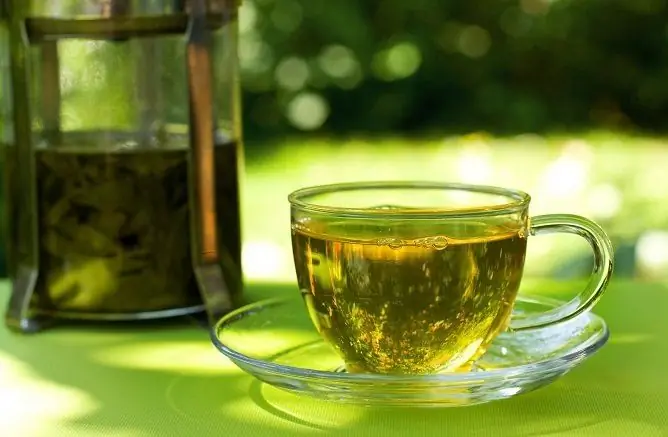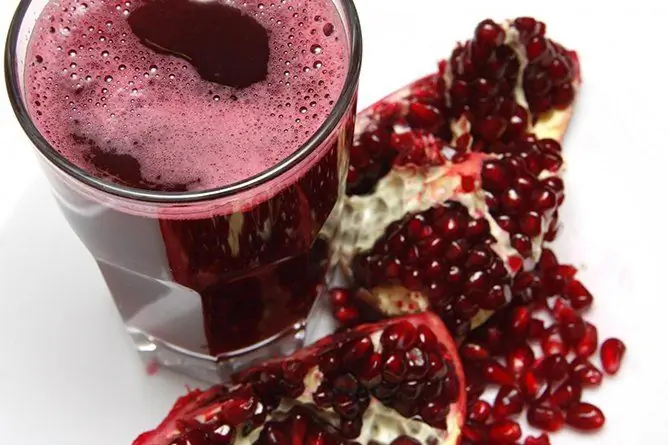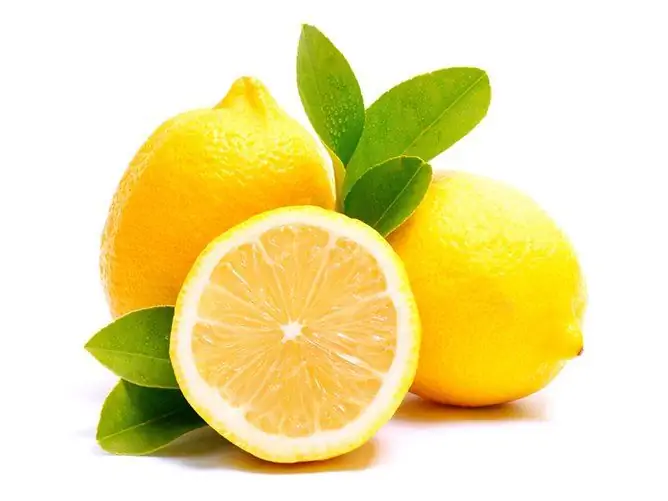- Author Rachel Wainwright wainwright@abchealthonline.com.
- Public 2023-12-15 07:39.
- Last modified 2025-11-02 20:14.
Increases the pressure of green tea or lowers
The content of the article:
- The benefits and harms of green tea
- Other properties of green tea
- How to brew green tea properly
- Which green tea to choose
- Green tea during pregnancy
- Video
Green tea raises or lowers blood pressure - a question that is relevant for many people, since this drink is very popular, at the same time, many of its fans, including middle and young people, suffer from high or low blood pressure. Healthy lifestyle advocates recommend it for all cases, but do doctors agree with them? Let's try to figure it out.
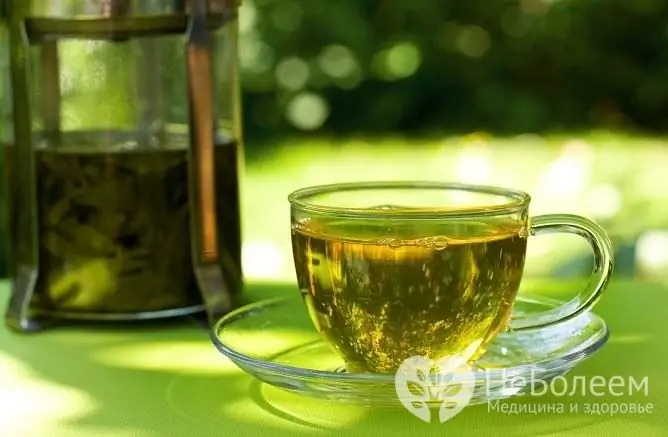
Green tea, in addition to regulating pressure, has many beneficial properties.
The benefits and harms of green tea
To understand whether it is possible to drink green tea with high blood pressure, you should find out what substances are included in this drink and what effect they have on the heart and blood vessels.
There is an opinion that there is no caffeine in the composition of green tea, and therefore it not only does not increase blood pressure, like black tea or coffee, but on the contrary, helps to lower it. Obviously, this is due to the color of the drink - caffeine is associated with the dark color of natural coffee. However, doctors' reviews do not support this opinion.
In fact, a cup of strong black tea contains 14-70 mg of caffeine, and the same amount of green tea contains 25-45 mg. That is, in fact, the content of the pressure-increasing substance in green tea can be higher than in black tea, although slightly lower than in coffee (50-300 mg per cup, depending on the variety). Therefore, green tea increases blood pressure, has a tonic effect. This statement is easily confirmed empirically - it is enough to measure blood pressure before and after drinking tea.
In addition to caffeine, green tea contains many other substances:
- vitamins B, C, P and PP;
- taurine;
- minerals;
- catechins are powerful natural antioxidants.
Taurine is one of the amino acids. In the human body, it has the following effect:
- improves metabolic processes in internal organs, brain;
- increases tissue sensitivity to insulin;
- has a mild diuretic (diuretic) effect;
- eliminates edema;
- increases the strength of the heart;
- reduces the tone of blood vessels.
Due to its high content of taurine and its ability to stimulate diuresis and reduce vascular tone, green tea lowers blood pressure.
That is, it is impossible to give an unambiguous answer to the question of whether green tea increases or decreases blood pressure. 10-15 minutes after a person drinks a cup of hot green tea (it does not matter, with or without lemon), his blood pressure will rise. However, after 30-40 minutes, the diuretic effect of taurine begins to appear, and blood pressure decreases.
Given the above, it becomes clear why doctors still do not recommend drinking green tea, which lowers blood pressure, with hypertension. But for persons prone to high blood pressure, this drink can be recommended for prophylaxis (naturally, its use does not negate the need to take the pills prescribed by the doctor).
Other properties of green tea
Arterial hypertension is one of the risk factors for the development and rapid progression of atherosclerosis, which, in turn, creates the prerequisites for a further increase in pressure. This is the so-called vicious circle. Green tea, due to its high content of antioxidants and vitamins, has a pronounced anti-atherogenic effect, that is, it helps protect blood vessels from the negative effects of cholesterol. Therefore, it is excellent for men and women as a means of preventing atherosclerosis and related diseases of the cardiovascular system (coronary heart disease, cerebral stroke).
Green tea antioxidants actively protect the human body from the damaging effect of lipid peroxidation products on cells, that is, they reduce the risk of malignant neoplasms.
The vitamins contained in green tea stimulate the body's defenses, which makes this drink an effective immune stimulating agent.
Despite all its beneficial properties, green tea can be harmful to the body if consumed in excessive quantities, which is associated with the negative effects of high doses of caffeine.
How to brew green tea properly
To get the most out of green tea, it must be brewed properly. This requires:
- rinse the teapot with boiling water;
- put tea leaves in it at the rate of 3 g per 200 ml of water;
- pour dry tea with hot water, the temperature of which should not exceed 85 ° C (not boiling water!);
- insist 2-3 minutes;
- Strain the finished drink into another container through a strainer, removing the tea leaves.
If green tea is brewed with boiling water or infused for more than three minutes, then instead of a healthy, tasty and aromatic drink, you will get a bitter and unpleasant-tasting liquid, devoid of some of the beneficial properties.
Many people prefer to drink green tea cold as it is a great thirst quencher. If it has been brewed correctly, then it retains its properties in a chilled form, however, long-term storage (more than 1-2 hours) should be avoided.
Which green tea to choose
There are many different brands of green tea in stores, and many people are looking for an answer to the question of which brand to choose.
Experts advise choosing green tea that does not contain artificial flavors, such as the well-established 95 brand. Natural flavors, such as jasmine flowers or citrus peel, do not spoil the drink, but enrich it. This tea has a delicate aroma, pleasant taste and does not have a negative effect on the body.
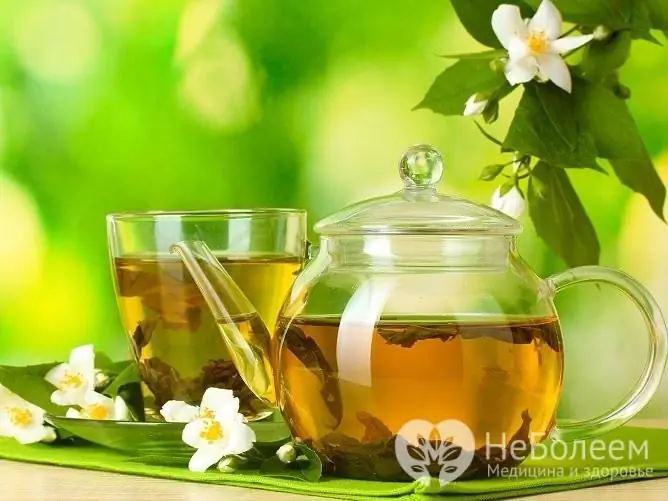
To enhance the taste of green tea, it is better to prefer natural flavors such as jasmine
Green tea during pregnancy
Women in early pregnancy often suffer from low blood pressure. Knowing that green tea tones up and has many beneficial properties, expectant mothers begin to consume this drink in large quantities. However, doctors oppose the excessive consumption of even such a useful remedy as green tea.
Pregnant women can consume no more than 200 mg of caffeine per day without risk to the health and development of the fetus. It should be remembered that caffeine is found not only in tea or coffee, but also in chocolate, Coca-Cola, and energy drinks. In this regard, you should drink no more than 1-2 cups of weak green tea per day. Such a dose of caffeine will not harm, but, on the contrary, will have a tonic effect, saturate the body with vitamins, minerals and antioxidants.
It should also be noted that green tea impairs the absorption of folic acid and iron, which are much needed by pregnant women, from the gastrointestinal tract, so it is recommended to drink it no earlier than 2-3 hours after eating.
Thus, green tea during pregnancy is not considered a forbidden drink, however, its consumption should be limited.
Video
We offer for viewing a video on the topic of the article.

Elena Minkina Doctor anesthesiologist-resuscitator About the author
Education: graduated from the Tashkent State Medical Institute, specializing in general medicine in 1991. Repeatedly passed refresher courses.
Work experience: anesthesiologist-resuscitator of the city maternity complex, resuscitator of the hemodialysis department.
Found a mistake in the text? Select it and press Ctrl + Enter.

